Out Of The Ashes
The Christmas-New Year Fires have been a devastating experience for so many people in NSW and Victoria. It's been a time of reckoning as we come face to face with the effects of the long-running drought and the impact of climate change. Having had a life-long association with the south coast for many years I wanted to share my family's experiences during this time and express our gratitude to the amazing women and men of the RFS for their tireless efforts over this horrible period.
 It’s a dull Tuesday afternoon and I’m driving the familiar route south on the Princes Highway for the first time this year. The fall of rain on the windscreen is annoying enough to need the wipers but barely there. I’m heading down to visit my daughter, her partner and my grandson, to do my bit to boost the local economy with a spot of retail therapy and to witness the havoc that’s been wreaked on my favourite part of the world by the new year fires. Adele sings something mournful on the radio. The dreary weather matches my mood and the landscape, and as I leave the industrial fringe of Nowra behind me, the tension in my neck and shoulders travels to my grip on the steering wheel. My destination is the family holiday house at Little Forest we’ve owned for 20 years – we spent our first Christmas holiday there when I was pregnant with my youngest daughter. Many of my happiest memories spring from lazy days and summer weekends, blissfully endless school breaks spent in our timber house tucked beneath the escarpment, overlooking the Morton National Park. Our eldest has lived there permanently for almost five years. She runs a horse training business on the property with her partner and is raising her son in the place she now calls home. It’s the place where we all began horse-riding, where the desire to write first itched at my fingertips, where my first published novel Blackwattle Lake was set, where we’ve spent enough time to feel like locals. My connection to the area goes way back to my childhood when my family rented a house every year for three weeks at Burrill Lake. I’d spend hours and days beach-combing, floating on my airbed in the blistering summer sun, eating Jaffas at the open air picture theatre where we took blankets and pillows to watch movies under the stars. Every trip down here is a home-coming, a long slow exhale as the busy-ness of life in Sydney gives way to the soothing calm of the bush and the mesmerising whispers of the ocean. But this drive, this visit, is different. Dread anchors itself in the shallows of my stomach. A month ago my husband and I were planning a relaxing week here with the family. Instead he dealt with the chaos of the fires while two hours to the north I tended to evacuated horses, dogs and people. I minded the little man while his parents packed as many belongings as they could into their cars, watched houses at the eastern end of the road burn while their helpless – and now homeless – owners looked on, sobbing. We spent New Year’s Day in a state of no-so-mild panic, unable to contact them after they’d been stranded in town, the roads blocked as the fires spread. Cobargo had already burnt, Mogo too. As hard as it was to contemplate, it wasn’t out of the question that Milton could come under attack. Communications were out, there was no petrol, no power. People queued outside supermarkets waiting to be led into the store by a shop assistant with a torch to choose a maximum of six items. Low lying clouds of smoke suffocated the town. Thousands of hectares of bushland burned, closing roads and businesses. Flames spread through the valley below our house, almost but not quite reaching our property. As soon as they could travel north my daughter’s little family did, returning days later with my husband to man hoses and put out the many spot fires snaking through the undergrowth.
It’s a dull Tuesday afternoon and I’m driving the familiar route south on the Princes Highway for the first time this year. The fall of rain on the windscreen is annoying enough to need the wipers but barely there. I’m heading down to visit my daughter, her partner and my grandson, to do my bit to boost the local economy with a spot of retail therapy and to witness the havoc that’s been wreaked on my favourite part of the world by the new year fires. Adele sings something mournful on the radio. The dreary weather matches my mood and the landscape, and as I leave the industrial fringe of Nowra behind me, the tension in my neck and shoulders travels to my grip on the steering wheel. My destination is the family holiday house at Little Forest we’ve owned for 20 years – we spent our first Christmas holiday there when I was pregnant with my youngest daughter. Many of my happiest memories spring from lazy days and summer weekends, blissfully endless school breaks spent in our timber house tucked beneath the escarpment, overlooking the Morton National Park. Our eldest has lived there permanently for almost five years. She runs a horse training business on the property with her partner and is raising her son in the place she now calls home. It’s the place where we all began horse-riding, where the desire to write first itched at my fingertips, where my first published novel Blackwattle Lake was set, where we’ve spent enough time to feel like locals. My connection to the area goes way back to my childhood when my family rented a house every year for three weeks at Burrill Lake. I’d spend hours and days beach-combing, floating on my airbed in the blistering summer sun, eating Jaffas at the open air picture theatre where we took blankets and pillows to watch movies under the stars. Every trip down here is a home-coming, a long slow exhale as the busy-ness of life in Sydney gives way to the soothing calm of the bush and the mesmerising whispers of the ocean. But this drive, this visit, is different. Dread anchors itself in the shallows of my stomach. A month ago my husband and I were planning a relaxing week here with the family. Instead he dealt with the chaos of the fires while two hours to the north I tended to evacuated horses, dogs and people. I minded the little man while his parents packed as many belongings as they could into their cars, watched houses at the eastern end of the road burn while their helpless – and now homeless – owners looked on, sobbing. We spent New Year’s Day in a state of no-so-mild panic, unable to contact them after they’d been stranded in town, the roads blocked as the fires spread. Cobargo had already burnt, Mogo too. As hard as it was to contemplate, it wasn’t out of the question that Milton could come under attack. Communications were out, there was no petrol, no power. People queued outside supermarkets waiting to be led into the store by a shop assistant with a torch to choose a maximum of six items. Low lying clouds of smoke suffocated the town. Thousands of hectares of bushland burned, closing roads and businesses. Flames spread through the valley below our house, almost but not quite reaching our property. As soon as they could travel north my daughter’s little family did, returning days later with my husband to man hoses and put out the many spot fires snaking through the undergrowth. 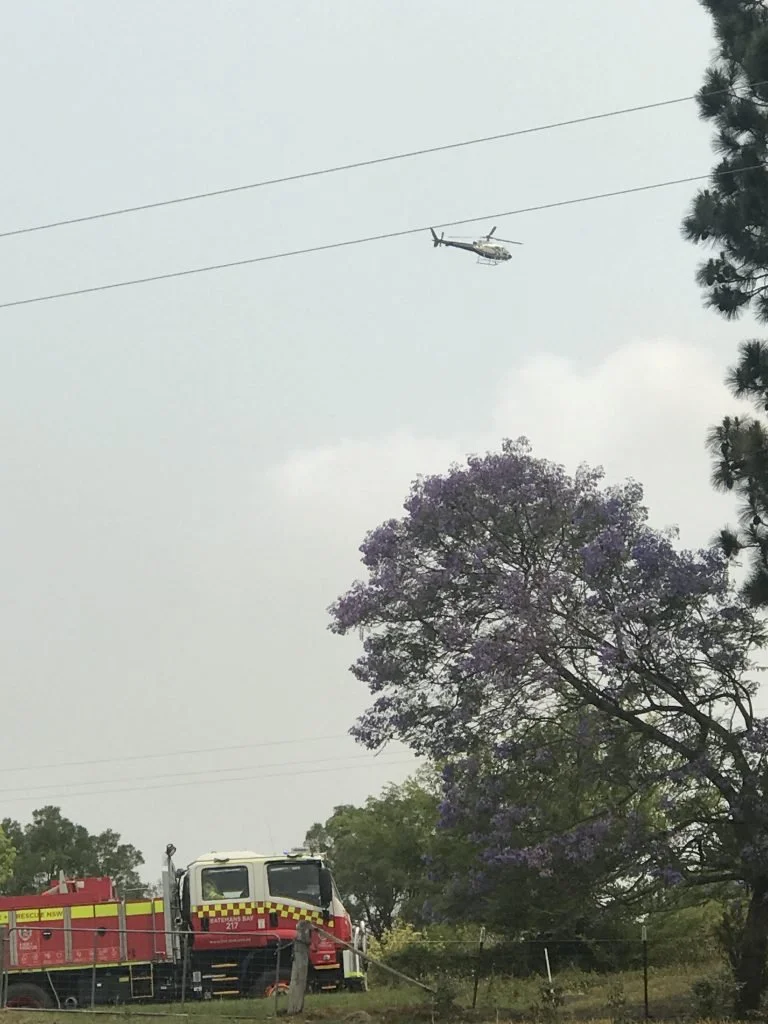

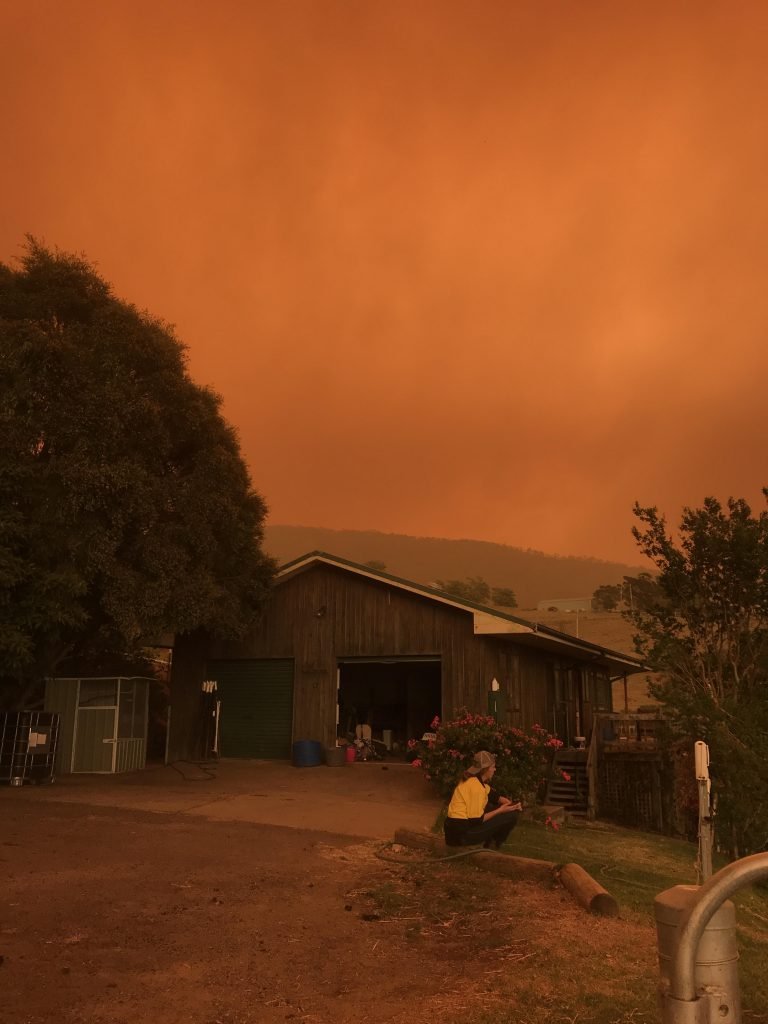 Then came that Saturday. Our neighbour, a fireman, advised my daughter and her partner not to stay given the aged timbers of the house so they got out while they could. Despite the dire situation all I could feel was relief to have them all home under my roof. Together, we sweltered indoors as we sat glued to the TV or listened in to the RFS radio, trying to glean any information we could about what was happening, not just to our house, but to the homes of friends in the area. We kept watch on the Fires Near Ae app as the burn zone closed in around the house. Then, the news we’d dreaded: the fire was back at Little Forest and this time it had reached our end of the road. Hours passed until finally neighbours who had made the decision to stay sent through photos. By some absolute miracle – and with the combined efforts of neighbours and fire-fighters – our house had been saved. Most of the paddocks were scorched, the trees and gardens and fencing all burnt but somehow the house remained standing. The fire had been and gone leaving a trail of devastated bushland in its wake. Powerlines were down and the tank was full of ash so any return to the house had to wait. Their horse-training business had now been on hold for a month and the bank balance was dwindling so as soon as it was possible my daughter headed back to resume her part-time job in town. For days she lived with no electricity and no running water but at least there was a roof over her head and four solid walls keeping her safe. She spent the hours before work clearing the debris – melted buckets and the charred remains of a bower bird,
Then came that Saturday. Our neighbour, a fireman, advised my daughter and her partner not to stay given the aged timbers of the house so they got out while they could. Despite the dire situation all I could feel was relief to have them all home under my roof. Together, we sweltered indoors as we sat glued to the TV or listened in to the RFS radio, trying to glean any information we could about what was happening, not just to our house, but to the homes of friends in the area. We kept watch on the Fires Near Ae app as the burn zone closed in around the house. Then, the news we’d dreaded: the fire was back at Little Forest and this time it had reached our end of the road. Hours passed until finally neighbours who had made the decision to stay sent through photos. By some absolute miracle – and with the combined efforts of neighbours and fire-fighters – our house had been saved. Most of the paddocks were scorched, the trees and gardens and fencing all burnt but somehow the house remained standing. The fire had been and gone leaving a trail of devastated bushland in its wake. Powerlines were down and the tank was full of ash so any return to the house had to wait. Their horse-training business had now been on hold for a month and the bank balance was dwindling so as soon as it was possible my daughter headed back to resume her part-time job in town. For days she lived with no electricity and no running water but at least there was a roof over her head and four solid walls keeping her safe. She spent the hours before work clearing the debris – melted buckets and the charred remains of a bower bird, 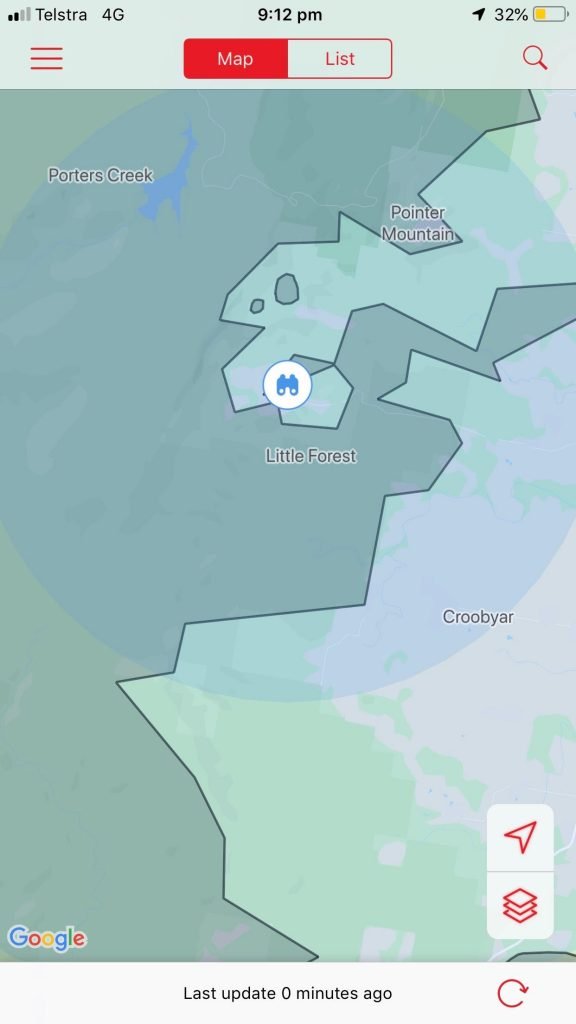
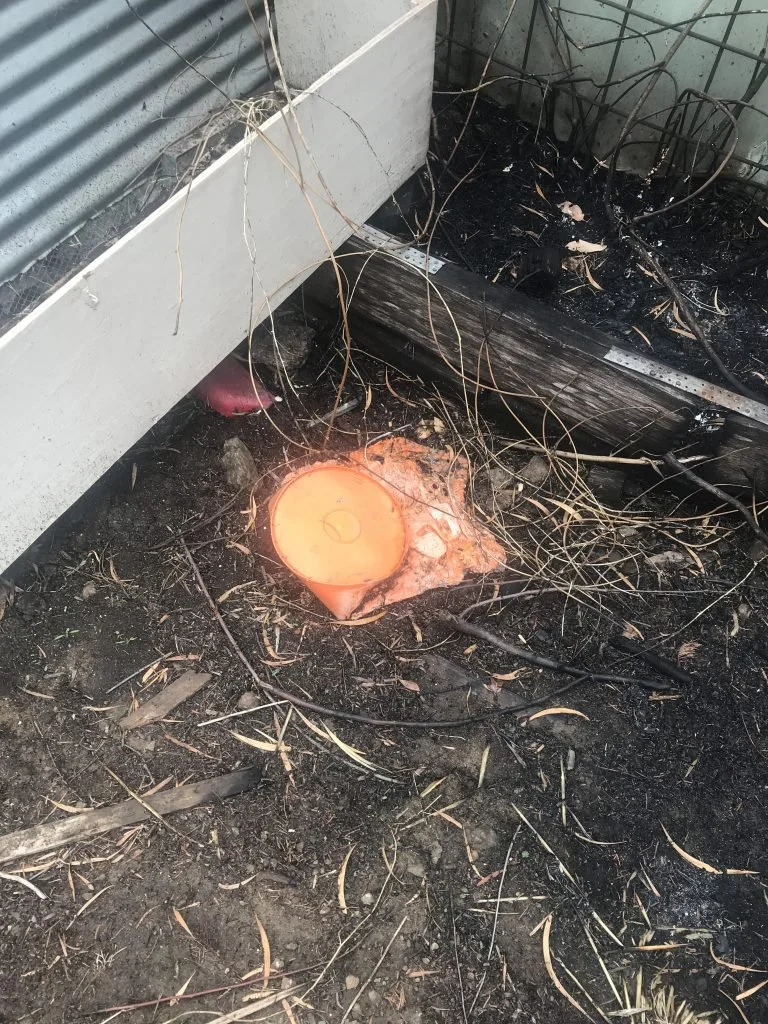
 I keep driving but switch the music off, silence a more appropriate soundtrack. The white trunks of the towering gums flanking the highway soon give way to long stretches of sepia toned forest, the undergrowth stripped bare, the earth beneath them charred and barren. By the time I reach the Sussex Inlet turn off I’m driving through a wasteland. News images of a policeman screaming at motorists to turn back as the flames around him fly skyward flicker in my head. I stare at the remains of trees in exactly the same location. Here, everything is black. Leafless branches claw the sky. Houses ordinarily out of sight from the road, now sit exposed, naked. I pass the turn off to the well-loved Yattah Yattah nursery, reduced to rubble, where the 80-year-old owners lost their beloved dog, their home and a business they will probably never rebuild. Impossible patches of green snatch my breath, and as I inch closer to Milton wider sections of paddocks and the familiar sight of grazing cows are salves for my wounded spirit. The dragon’s hot breath spewed out at random, devoured everything in one pocket, leaving the next patch unscathed.
I keep driving but switch the music off, silence a more appropriate soundtrack. The white trunks of the towering gums flanking the highway soon give way to long stretches of sepia toned forest, the undergrowth stripped bare, the earth beneath them charred and barren. By the time I reach the Sussex Inlet turn off I’m driving through a wasteland. News images of a policeman screaming at motorists to turn back as the flames around him fly skyward flicker in my head. I stare at the remains of trees in exactly the same location. Here, everything is black. Leafless branches claw the sky. Houses ordinarily out of sight from the road, now sit exposed, naked. I pass the turn off to the well-loved Yattah Yattah nursery, reduced to rubble, where the 80-year-old owners lost their beloved dog, their home and a business they will probably never rebuild. Impossible patches of green snatch my breath, and as I inch closer to Milton wider sections of paddocks and the familiar sight of grazing cows are salves for my wounded spirit. The dragon’s hot breath spewed out at random, devoured everything in one pocket, leaving the next patch unscathed. 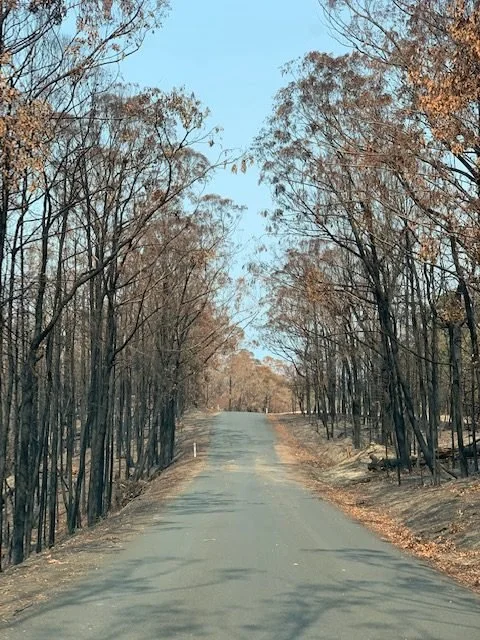 As afternoon evaporates into evening I turn onto Little Forest Road. I’ve seen photos of the street, our house, but nothing has prepared me for this reality. My daughter calls. Where are you, she says. I don’t know, I say. On another planet, I add. In a warzone. Well, don’t stop along the road to take any photos, she replies. Trees are still falling. My throat is as dry as the scene before me. Houses I’d driven past and admired for years are now nothing but piles of brick and twisted mounds of corrugated tin. Others homes are in tact but surrounded by blackened trees, a testament to the bravery of their owners and the fire-fighters. I hit the stretch of national park that reaches all the way up to the escarpment. A tree-army of charcoaled skeletons stand soldier-straight on both sides of the road. It’s a landscape of death and destruction. This is crazy, I whisper to the world as I wind up the hill towards our house. I look for the lyrebird who so often scurries across the road on the bend, see nothing but ash and broken branches littering the asphalt. Dead leaves line the verge – if this was autumn and they weren’t gum leaves the sight would be quite beautiful. At the top of our driveway I stop to look out across the valley. When we’d first seen this house the stunning views of state forest melting into farmlands and the distant stretch of sea drew us under its spell. I look out now across a foreign landscape, scorched hectares of bush that surely cannot sustain life and the tears finally fall. How much wildlife has been lost? How will the bush ever recover? Miraculously at least half of our paddocks are lush and intact, but the fences and gardens are gone. Rebuilding will take time, but it will happen. We’ve been luckier than so many others who have lost homes, and in some cases their lives or loved ones. Down the road a few kangaroos munch on the grass in a neighbour’s paddock. My daughter makes strings of corn cob and sweet potato for the possum who now visits each night. My grandson stands at the window looking out at the scarred bushland. Smokey, he says, then Fire. It’s not, and there isn’t one, but his budding vocabulary has two new words I’d rather it didn’t contain. After a couple of solid downpours of rain new grass is sprouting. Rosellas perch in the branches of the still-green apple tree and feed on the blossoms, a stark contrast to the blackened fig, grevilleas and camellias standing alongside. Cows graze on the hills across the way. The surrounding houses are occupied again with neighbours we’ve come to know much better over the last few weeks. Life is returning to normal, or at least a new normal with tank water that tastes and smells like ash. Do Not Feed the Wildlife signs deter tourists from encouraging animals to the roadside where they can be killed, and a drab patchwork of bush leaves an ache rather than a song in my heart.
As afternoon evaporates into evening I turn onto Little Forest Road. I’ve seen photos of the street, our house, but nothing has prepared me for this reality. My daughter calls. Where are you, she says. I don’t know, I say. On another planet, I add. In a warzone. Well, don’t stop along the road to take any photos, she replies. Trees are still falling. My throat is as dry as the scene before me. Houses I’d driven past and admired for years are now nothing but piles of brick and twisted mounds of corrugated tin. Others homes are in tact but surrounded by blackened trees, a testament to the bravery of their owners and the fire-fighters. I hit the stretch of national park that reaches all the way up to the escarpment. A tree-army of charcoaled skeletons stand soldier-straight on both sides of the road. It’s a landscape of death and destruction. This is crazy, I whisper to the world as I wind up the hill towards our house. I look for the lyrebird who so often scurries across the road on the bend, see nothing but ash and broken branches littering the asphalt. Dead leaves line the verge – if this was autumn and they weren’t gum leaves the sight would be quite beautiful. At the top of our driveway I stop to look out across the valley. When we’d first seen this house the stunning views of state forest melting into farmlands and the distant stretch of sea drew us under its spell. I look out now across a foreign landscape, scorched hectares of bush that surely cannot sustain life and the tears finally fall. How much wildlife has been lost? How will the bush ever recover? Miraculously at least half of our paddocks are lush and intact, but the fences and gardens are gone. Rebuilding will take time, but it will happen. We’ve been luckier than so many others who have lost homes, and in some cases their lives or loved ones. Down the road a few kangaroos munch on the grass in a neighbour’s paddock. My daughter makes strings of corn cob and sweet potato for the possum who now visits each night. My grandson stands at the window looking out at the scarred bushland. Smokey, he says, then Fire. It’s not, and there isn’t one, but his budding vocabulary has two new words I’d rather it didn’t contain. After a couple of solid downpours of rain new grass is sprouting. Rosellas perch in the branches of the still-green apple tree and feed on the blossoms, a stark contrast to the blackened fig, grevilleas and camellias standing alongside. Cows graze on the hills across the way. The surrounding houses are occupied again with neighbours we’ve come to know much better over the last few weeks. Life is returning to normal, or at least a new normal with tank water that tastes and smells like ash. Do Not Feed the Wildlife signs deter tourists from encouraging animals to the roadside where they can be killed, and a drab patchwork of bush leaves an ache rather than a song in my heart. 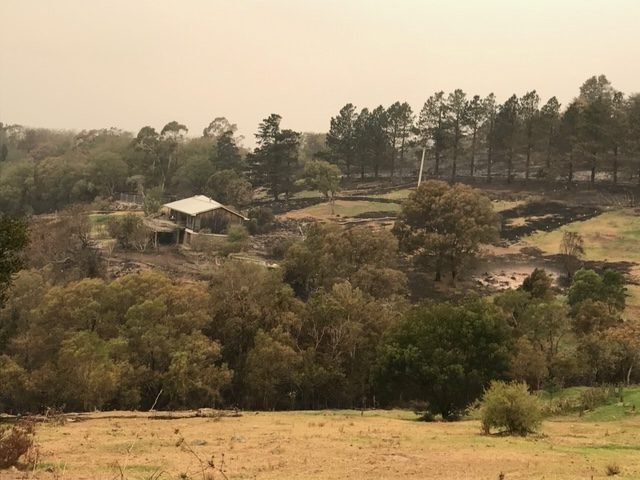
 I wrote Blackwattle Lake in 2009, drawing on my own experience of being stuck in Milton when fire erupted north of the house, and the Black Saturday bushfires of the previous year were still fresh in my mind. What if the fires did come close?I wondered. What if the road was blocked when you were at home, and not in town? What if you were stuck there and had to try and save your property? This year my family and friends lived the reality of those hypothetical questions and thankfully all stayed safe. In time, the bush will regenerate and despite the enormous losses, the wildlife will return.The scars on the landscape and in all of our memories will long remain.
I wrote Blackwattle Lake in 2009, drawing on my own experience of being stuck in Milton when fire erupted north of the house, and the Black Saturday bushfires of the previous year were still fresh in my mind. What if the fires did come close?I wondered. What if the road was blocked when you were at home, and not in town? What if you were stuck there and had to try and save your property? This year my family and friends lived the reality of those hypothetical questions and thankfully all stayed safe. In time, the bush will regenerate and despite the enormous losses, the wildlife will return.The scars on the landscape and in all of our memories will long remain.

